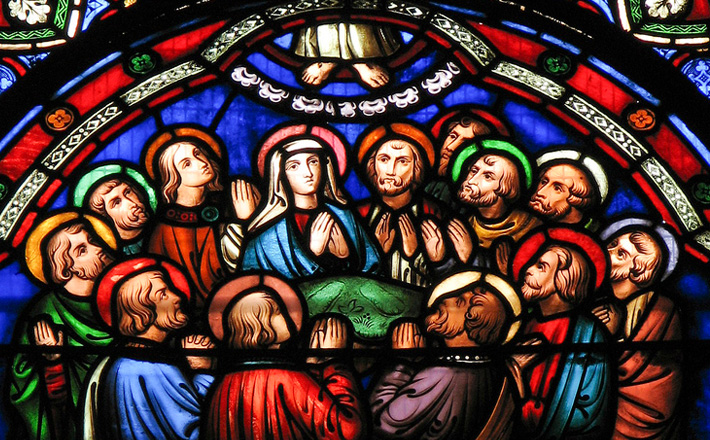Commentary on 1 Peter 4:12-14; 5:6-11
Suffering is a major theme in 1 Peter. The word is mentioned twelve times in this short letter.
This repetition makes it clear that the audience is experiencing difficult circumstances. And yet the writer wants to remind them that they are not alone in their suffering. He writes: “for you know that your brothers and sisters in all the world are undergoing the same kinds of suffering” (1 Peter 5:9).
How poignant for our contemporary moment! As the world journeys through this pandemic, perhaps we can find some solace in knowing that we, too, are united in our suffering. We are never suffering alone.
The universality of suffering, however, should not be mistaken for the necessity of it. Even more, the relationship between suffering and faith should not be understood as determinative. In other words, suffering is not necessary for one to have faith, to be considered faithful, or to build one’s faith. To that end, the term suffering requires definition.
What do we mean when we say suffering? Do we understand suffering to mean anguish or severe pain that is physical, psychological, spiritual or some combination of these? Do we understand suffering to be something we should tolerate or is suffering unpleasant experiences that we endure? Our understanding of and experience with suffering can determine how we read and understand this letter. Despite our definition, it is important to acknowledge that suffering has the potential to both harm and transform.
Sharing in Christ’s suffering
Our understanding of Christ’s suffering should not be limited to the physical pain that he endured on the cross. The mental and spiritual anguish of betrayal and separation must be considered. Moreover, we cannot separate the suffering from the work that lead Jesus to the cross. His crucifixion was the result of an attempt to transform oppressive systems, to assert the importance of the lives of marginalized people, indeed, to challenge a worldview that suffering of the many was necessary for the pleasure of a few. Jesus taught about experiencing a life of abundance and fullness in a kin-dom that is here now and one that is to come.
Oppressive systems that subject people to suffering must be challenged and ultimately destroyed. When we overlook this connection between Jesus’ life and ministry and his death, we miss an opportunity to create a more just and peaceful world. We share in Christ’s suffering when justice is denied, when righteousness is not realized, and when the conditions for peace are elusive. So the author of the letter reminds the audience that they should not be surprised when they are standing for righteousness, fighting for justice, and are pursuing peace that they are met with obstacles and challenges. Jesus, too, was challenged in this pursuit.
Yet, a hope lies in knowing that suffering is not eternal. No, trouble don’t last always. He writes: “after you have suffered for a little while, the God of all grace … will restore, support, strengthen, and establish you.” We must know that on the other side of suffering, there is restoration.
Bearing the name of Christ
The followers are Christ not only share the experience of suffering, they share a common name. What’s in a name? Though names can be seen as a way of identifying someone or something, how we choose to identify ourselves is significant. Often, we describe ourselves in terms of our relationship to others – partner, parent, child, sibling. Naming is an important way to solidify group identity. In many parts of the world, one can discern a lot about you simply from your name. So, what does it mean to call ourselves Christian?
The name, Christian, has always meant different things to different people. This remains true today. Historically, the term was, at times, negative, even derogatory (see 1 Peter 4:16). The writer of 1 Peter is exhorting the audience to embrace the name as a badge of honor, not shame. To be Christian meant belonging to an elite group, to be God’s chosen people. He writes: “If you are reviled for the name of Christ, you are blessed because the spirit of God is resting on you.” The bearers of the name should not only be associated with particular beliefs, but they must also exhibit particular behaviors. That is, their actions should be aligned with their beliefs.
Humility, discipline, and resistance
After affirming and encouraging the community in their beliefs, the writer then gives them ethical directives for how they are to behave. The directives in this lection can be summarized in three words: humility, discipline, and resistance. This community is described as outsiders, exiles and aliens, who are learning how to leave peaceably with each other and with those who are mistreating them. In many ways this advice is intended to instruct them for how to live in this environment.
Humility requires self-awareness. It is not, however, analogous with self-degradation or low self-regard. Humility must be considered in relationship to God. Humility is what enables the believer to come before God and cast their anxieties before him. I think a fishing analogy may be instructive here. To cast one’s net or line means to throw it far into the sea anticipating a catch.
Casting one’s anxiety may be seen similarly. We should “throw” our worries and concerns far away from ourselves to God anticipating that God’s care and concern will address them. One does not cast their line out with the bait and hope to pull it back in with the same bait. You cast out something you do not want in exchange for something that you do want. God’s care for God’s people is expressed in God’s response to our prayers if we humbly ask for help when we need it.
Discipline, like humility, can be misunderstood. It often has a negative connotation, particularly when it is associated with punishment. However, discipline is repeated actions that are necessary to achieve positive results. It is a method of training. Discipline is waking up early every morning to run when you are preparing for a marathon. Discipline results in preparedness and vigilance. Discipline is reading the Bible, praying, and coming together with like-minded people (even if virtually) in order to better understand and continue to grow in one’s faith.
It is the steadfastness of one’s faith that enables them to resist any enemy that would come against the work to establish God’s kin-dom on earth. Our ability to stand against injustice and to stand with those who are considered to be “the least of these” is a form of resistance.
Resistance, humility, and discipline are acts of faith that guide how we should live.


May 24, 2020